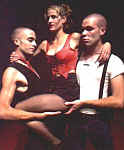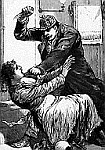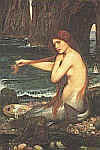|
home
advanced |
Figuring Figuration by Deborah
Knight VII Social Discourse in Literature In much the same way as Berkoff appears to consciously take on identities to suit his purposes, the script of his play Greek could be interpreted as proposing a similar project for women. While the role for the female protagonist is introduced as ‘Waitress’, it changes once she is liberated from the husband who maltreats her, becoming not ‘Mum’ as she logically should, but ‘Wife’. Although an objection could be made that Eddy remains himself throughout whereas her identity remains tied to her social function, obviously the point that is being made is that it is her mode of relating to her life-partner that is the essential factor and not the role society has bestowed upon her regardless of whether or not she is aware of the blood ties she shares with her new husband. These changes are evidently destined for the reader’s eyes alone as they serve in the text to allocate words to the same actress but are never spoken aloud, suggesting a silent form of revolution which would have more to do with a change in the way woman interprets her role in society’s overriding script than in rejecting her part altogether. Paradoxically it is not the real mum who becomes a wife that is being called into question, but all the real wives who play the parts of waitresses and mums. Rather than serve their husbands’ sexual needs as waitresses or cater to their daily requirements as a-sexual mums, wives could perhaps interpret their role in marriage as nothing other than a wife, on a decidedly equal footing with their husbands. It would be nice to think that everyone could change their enactment of their life roles for others better suited as the need was felt. However, as Sailor 1 of Sink the Belgrano! inadvertently demonstrates, the myriad ‘invisible’ beliefs that govern us render our ability to alter the course of our lives far more difficult than would be supposed, however perspicacious we may believe ourselves to be. Priding himself on his ability to think for himself, this sailor asks the others on board The Conqueror who they think they are there to protect and for whom, and is horrified by Sailor 2’s robotic response: ‘For self-determination of the Falkland folk / To make an omelette you gotta break some yolks’ (153). The lack of a coherent link between these two statements reveals them to be clear cases of unthinking quotation. While the clichéd use of the idiom is too common to necessitate commentary, Sailor 1 nonetheless picks him up on his understanding of the term ‘self-determination’:
Well
informed as he may hope to sound, Sailor 1 not only gets
his geography and hence his facts wrong, but resorts to
blind quoting himself. Although his citation shows he has
understood the fascist undertones of Hitler’s
perverse appropriation of the term
‘self-determination’ to signify the tyrannical
seizing and re-allocation of land to dictatorially confer
‘independence’ upon others, he is obviously no
more in possession of the true sense of the expression
than his colleague, despite his belief in his autonomy.
That he does not follow his reasoning through is clearly
evinced when he nevertheless announces that he will
fight, all the while continuing to attempt to reconcile
his individual right to think freely with the mindless
patriotic obedience demanded of the soldier. His very
presence on the submarine contradicts his strident
protestations, showing him to be every bit as guilty of
compliance as Sailor 2:
In fact, the very term ‘self-determination’ is adroitly chosen to illustrate the point being made, as it houses two distinct meanings of which one, upon reflection, clearly influences and therefore nullifies the other. Signifying both ‘the ability to make a decision for oneself without influence from the outside’ and ‘the right of a nation or people to determine its own form of government’ (Collins Concise), the second sense calls to mind all of the socializing decrees that hold a civilization together by regulating the behaviour of its citizens. Hence, the expression’s two meanings actually introduce the hermeneutic dilemma discussed in chapter 2. How can we determine things without influence from outside? How can we envisage something new when every attempt to re-interpret is perversely prefigured by the social discourses that preside over us from the outset? Let us look at some examples from East, Massage and Lunch that illustrate the difficulty individuals experience in perceiving clearly enough to free themselves of their illusions. 7.1 The ‘socializing’ effects of gender-related discourses
Two advantages to Berkoff’s distinctive way of juxtaposing monologues instead of having his characters speak in dialogue is it gives them the opportunity to divulge their particular worldview and reveal the social discourses that rule them, just as this method also evinces how very little their convictions enable them to effectively perceive the Other and take his or her actions or feelings into consideration. Whereas a great deal of experimental theatre attempts to shock its viewers out of their supposed complacency by demolishing the simple binary oppositions that hold society together, Berkoff juxtaposes both the individual’s personal conflicting perceptions and the incompatible viewpoints of distinct characters attempting to relate, making us marvel at how these binary oppositions succeed in thriving so naturally in internal and external cohabitation. Considering first the internal life of the individual, if Sailor 1 cannot get off the ‘boat’ of the overriding patriotic discourse that rules him, Sylv of East can no better extract herself from her self-harming delusions. The following passage demonstrates how very rapidly she swings backwards and forwards between her disagreeable perceptions of her environment and her relation to it, and the phantasms she creates to make her experience concord with the prescriptive ideals for women a far more refined society than hers continues to dictate. In this passage she gives her version of the fight between Mike and Les, romantically seeing Mike’s blood as having been gallantly shed for her, despite going on to tell us in the same breath that he has subsequently left her in the belief that she purposely provoked it:
In fact, a later instance in which she again quotes him shows her to be fully aware of the single-minded motivation that underlies not his proclamations of love, but his imperial demand for her ‘religious’ devotion, even if her use of the verb ‘quest’ hints that the wishful thinking that reverses their roles in her mind lingers on: ‘(“Doth thou not love me then”) he quests (“nor feel my intense pain, then see me not again, for you must sacrifice thy altar of lust-pink and pornographia to my tempered sullen and purple swollen flesh.”)’ (19). Having ‘waited’ on Mike for the duration of his ‘dive in and out… more a whip in, like a visit – quick, can’t stay just sheltering from the rain – cup o’tea hot and fast’ (19), her resulting anger has to struggle to be heard above the conditioned maternal ‘instincts’ that come rushing in to revive her devotion:
In fact, Sylv proves beyond a shadow of doubt that she has more than adequately integrated the altruistic ‘reflexes’ traditionally required of women (that perversely make their contradictory feminine duty to aspire to virtue so hard to fulfil), by going so far as to munificently call the ‘pile’ of ‘bones’ Mike leaves ‘satiate’. He is not so easily fooled, as his mocking description of her 'fluting gurgled falsettos’ (17) – ‘Mike oh Mike… What dost thou dooo!…’ (17) - indicates every bit as much as it makes manifest how little he cares. Well can he ‘flash his comb’ through his ‘Barnet fair’ (hair), for as far as he is concerned he has been to the ‘adult’ [Ref 2-57] amusement park Sylv’s mode of dress has shown him the way to. Her following description of her appearance in the third person shows to what extent she delivers herself unto the media’s dictates for women, just as this exterior sign of the relinquishment of her autonomy also hints at how conveniently it exempts her from all responsibility for the consequences: ‘Sylv: She were in ingredients of flesh-packed suavely fresh... deodorized and knicker white... lip gleam and teethed... shoes thick-wedged with seam running up the back of her leg as if to point the way to tourists pruriently lost...’ (15):
Preoccupied with watering and feeding his ‘snarling beasty’ (18), Mike hardly notices Sylv beneath him allowing herself to get ‘snarled beneath his bristly glass-edged jaw’ (18, my emphasis). Thankfully Berkoff’s alliteration makes the causal link between these two opposing experiences clear, as the actual participants’ awareness of their own and each other’s lack of presence is well nigh nil. The last line of the indented quotation from page 19 of East cited above bears witness to the extent to which Sylv’s thinking is muddled, as Mike can hardly be said to be offering her a ‘sacrifice’. Accustomed to submitting slave-like to his sexual whims, the first line of the same passage paradoxically reveals her to thereby nurture an image of herself as appertaining more nearly to the land of the Gods than he, even if the state of bliss such a dwelling place is supposed to confer upon its inhabitants is somewhat marred by her tears. By imagining these last to be ‘relics’ of young love tracing ‘mortal’ paths through the land of the dead, Sylv romantically elevates the ache of first love on one level of her consciousness while subconsciously figuring the pain of glimpsing to what extent the chivalrous romantic love a bygone culture ensured her would lead to a ‘future’ of married bliss is absent from her relationship with Mike. Once again it seems likely that John Osborne’s confrontational juxtaposition of readings from pornography and love poetry in his A Sense of Detachment which took London by storm in 1972 may well have inspired Berkoff’s East three years later, as this last so perfectly illustrates how little the diametrically opposed discourses that respectively target boys and girls contribute to their capacity to relate to each other. Margaret Atwood comments wryly on this difference in her essay entitled “Pornography”:
Les’s
description of his haste to get out of work so that he
and the fourteen-year-old Irish girl he has met can get
on with ‘hacking away at each other’s
goodies’ (23) or of getting ‘some
scrubber’ to give him ‘a reluctant J. Arthur
[Ref
2-58]… at the point of a seven-inch honed and
sharpened shiv menacing her jugular’ (38) shows him
to be taking his legacy every bit as seriously as Mike
who, as we have seen, is in the habit of viciously raping
his ‘girlfriend’. As the circular text of the
play insinuates [Ref 2-59], they are caught in a
treadmill in which a life of financially profiting from
crime and the State’s complicity in the abuse of
women is their only hope of making anything of
themselves:
7.2 Canonizing rape Unfortunately, exploitation of the aesthetics of rape is hardly limited to the business acumen of East End cops and robbers, as Berkoff’s use of canonical literature to portray the workings of Massage Dad’s projection of sexual desire onto two schoolgirls makes explicit. This extraordinarily long monologue [Ref 2-60] that parodies the lyrical ballads of 19th century England satirizes the way in which the myths and legends of ancient Greece and Rome raise the status of rape in the collective unconscious by portraying it to be the pastime of gods and statesmen, while the passage’s aping of the Romantics’ concern for the differing perceptions of the ‘inward’ and the ‘outward’ [Ref 2-61] eye is here employed to figure Dad’s difficulty in successfully differentiating between his external ‘reality’ and the sexual delusions his literary heritage has bequeathed him. Departing from the genre’s ostensible innocent delight in nature, his ‘pastoral’ is entitled ‘The Nature of Dirt’ and casts himself falling asleep beside ‘a tickling brook’ ‘clutching Wordsworth tenderly’, (207) only to awake as the god of Nature, that old goat ‘Pan’, and to set his lecherous sights upon two schoolgirls who appear to him now as nymphs. Apart from the conventions of the literary genres cited above that give this passage its dreamlike quality, other devices indicate to what extent Dad’s narrative is divorced from ‘reality’. His subjectivity is evoked in the quantity of similes he uses which reveal the type of associations he makes, with the quota of doubt we should accord his comparisons even further accentuated by the typical London slang modifier he uses in this one: ‘cotton blouses bulged apart and pearly buttons seemed to pop as if like young spring roses could not be restrained from opening their petals to nature’s gaze’ (208, my emphasis). Of course likening the girls’ breasts to ‘young spring roses’ subtly changes Dad’s ambition to ‘pick them’ into the most comprehensive and innocent of desires, even if the particularities of his allusions to the classics simultaneously indicate how, far from these girls yearning for his sexual attentions as he fondly imagines, he is in fact about to commit rape: the name of one of the schoolgirls corresponds to the beautiful wife of Menelaus, Helen, who was abducted by Paris and carried off to Troy; Dad’s heart pounds like ‘Tarquin’s before Lucrece’s rape’ [Ref 2-62] (208); and his description of one of the girls sighing and murmuring ‘in falsetto rippling flute’ evokes yet another story featuring attempted rape. And not only rape, for the fact that it was not Tarquin that raped Lucrece, but his son, would appear to insist upon the generation gap between Dad and the girls, hence adding to his potential felony the imminent expression of his latent pedophilia. Of course this reference also conversely calls our attention to the suspiciously pedophilic nature of the sexuality of the Greek or Roman gods that mythology elevates so, as the last of the above allusions may suggest: it metaphorical alludes to both the extent of Dad’s delusion by evoking his altered hearing, but also to the story of Syrinx, who, like so many of the prepubescent-looking nymphs who have to escape the determined lust of wily old gods by magically transforming themselves into trees or rivers or the suchlike, spurns Pan by sinking into the earth and being transformed into the reeds from which he subsequently makes his pipe. However, if these nymphs’ motivation in shedding their identities by merging with the a-sexual elements of nature was to escape domination, the way in which Pan blows through Syrinx’s ‘body’ to make his music symbolically portrays him to be continuing to configure her to the shape of his discourse even after her sexuality-losing mutation. Hence, while this allusion foreshadows Dad’s advances being repelled as the gods’ were, the girls’ identity and freedom of movement are shown to be determined, in similar fashion to the nymphs’, by a god-like patriarchal discourse that either views women as sexual and therefore as inviting rape, or as a-sexual and hence below notice but safe from harm. The sense of security of most young women probably fluctuates between these two states according to the rise and fall of their own concupiscence, their ability to dissimulate the upper curves of the latter, and their desired or undesired effect upon others. It is a paradox that women’s libido is still such a well-kept public secret for it is hardly borne out by the grand old age of Western literature’s metaphorical charting of her constant transition between the two states by alternatively depicting her as angelic or diabolic. A Berkoff staple, the movement back and forth between the spiritually high and the satanically low appears in his writing as a form of barometer measuring not only the level of both his male and female characters’ sexual excitement, but also of their corresponding guilt. Often projecting the former upon the object of their desire in the shape of the devil, they thereby absolve themselves of the latter by seeing themselves as victim to darker forces. For instance, City Gent’s appreciation of Mum rapidly drops from the exalting to the deprecatory as he solicits and anticipates her sexual services: ‘pray gentle nymph / thou sweet and foul / thou noxious temptress in these cells of red / tell me thou devil what treasure I might avail myself of’ (192, my emphasis). Similarly, Dad sees the ‘shining schoolgirl flag’ of one of the girls ‘unblemished white’ knickers unpeeling ‘like a second skin does from a snake’, impelling him to creep ‘snake-like’ (209) himself upon them. And Mum of Massage presumptuously imagines the only fantasies that could interest Scot would feature ‘whips and frightened teenagers’ (203), whereas his own actually reveal him to sensually place woman upon high. However, most of Berkoff’s characters respect the usual polarizing values of society that figure woman as a-sexual and man as sexual by further figuring themselves as angels and devils respectively, despite the fact that their underlying motivations frequently deserve the opposite appellation. For instance, Harry of the short story Say a Prayer for Me [Ref 2-63] senses ‘an awful and sad need to prove his worth’ and the ‘attractiveness’ (13) of the woman he has invited into his room. He grabs her nervously and after sending ‘differing prayers to darker beings for the parole of his cock’ (15), ‘impales’ her with ‘H’ with the ‘slender ambition of merely filling her space for the duration of time it takes to be a bedsitter hero’ (16), only to lose almost immediately his ‘borrowed’ impetus. Far from being the egotistical macho his subsequent actions make him appear, he silently berates himself for not having let the ‘angels of libido feast only after the benedictions of Aphrodite’ (15) and sorely feels how he has ‘failed Doris, …failed himself, and…failed God, …failed fate that had brought them together, and …failed her two-year-old that he surely would have loved’ (17). Sensing well enough that they both have ‘souls that if united would …[conquer] everything’ (18), his wretchedness impels him to throw her out, feeling all the worse when she meekly takes his rejection as her due for having given in to him on her first date. Mistaking himself for the devil for having proceeded so impetuously and insensitively, he just as erroneously elevates her equally damaging docility: ‘she actually apologized (did angels sing her to her sleep?)’ (18). Conversely, although Woman of Lunch affects great tolerance on hearing Man’s job is ‘selling nothing’ other than ‘empty space’ in a trade book into which a buyer could ‘insert his identity, his wares… his amazing declarations’ (222), she is rapidly shown to attach great importance to such considerations when she compels Man to help her conserve her sense of virtue by pretending to take her by force. The stage directions make it clear that prior to the following passage she makes no attempt to free herself from his embrace in spite of her protestations, switching here to the opposite method of contradicting her actions with her words:
Of course Man and Woman’s highly exaggerated version of this commonly enacted role playing during courtship is easily seen to be inspired by William Blake’s well-known, not to say ‘household’, poem: “Rose, thou art sick!”
If anything, this piece of theatre ironically draws our attention to how well-versed man and woman are at enacting the ritual of ‘losing Woman’s virginity’ at the start of each new liaison in order to keep up appearances. Obviously, there is a certain sense of security that keeps both immured in these roles even if the actual enactment of woman’s part not only contradicts the purity of the original role, but also corrodes the force of man’s delivery by pointing to its lack of authenticity. Hence, in Massage we have Scot figuratively signaling his adherence to the proprieties that polarize the sexes by mirror-imaging the syllables in the rhyme with which he metonymically separates the fair sex from the lewdness of man, while concomitantly revealing to what extent he is certain of achieving his ends by having to prompt woman not to forget her part: ‘I would so calmly lift the gentle dress and wait for her to stop my filth caress’ (Massage 204, my emphasis).
© Deborah Knight 2001 |











